

Anastasiia
Don't Expect Toddlers To Behave Consistently — They Literally Can't. Can Free Play Prevent Depression and Anxiety In Kids? Over the past 50-60 years, play time in kids’ lives has been drastically cut.
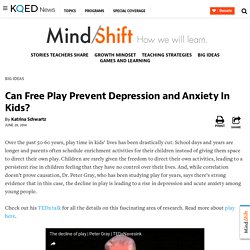
School days and years are longer and parents often schedule enrichment activities for their children instead of giving them space to direct their own play. Children are rarely given the freedom to direct their own activities, leading to a persistent rise in children feeling that they have no control over their lives. And, while correlation doesn’t prove causation, Dr. Peter Gray, who has been studying play for years, says there’s strong evidence that in this case, the decline in play is leading to a rise in depression and acute anxiety among young people.
Check out his TEDx talk for all the details on this fascinating area of research. Which Early Childhood Experiences Shape Adult Life? By Maanvi Singh, NPR Most of us don’t remember our first two or three years of life — but our earliest experiences may stick with us for years and continue to influence us well into adulthood.
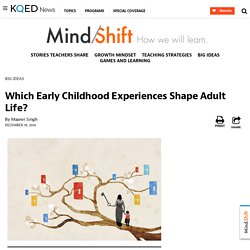
Just how they influence us and how much is a question that researchers are still trying to answer. Why Empathy Holds the Key to Transforming 21st Century Learning. By Thom Markham Like other aspects of modern life, education can make the head hurt.
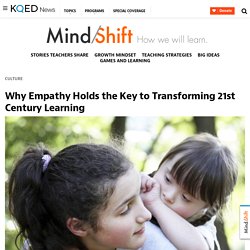
Key Person & Attachment. The Key Person Children thrive from a base of loving and secure relationships. This is normally provided by a child’s parents but it can also be provided by a key person. How Are Happiness and Learning Connected? As teachers, we also know that when students' affective filters or defenses are sky high, fight or flight responses will be modus operandi. A room full of defensive behaviors (withdrawn, angry) is a sad, unproductive place to teach and learn. What to consider when teaching English in large classes. How many students do you teach?
Do you feel that your classes are too big? Author and education consultant Jason Anderson looks at the issues and offers some potential solutions. For many of us, our classes are larger than we would like them to be. They can present a number of challenges that teachers of smaller classes are less likely to face. But what exactly do we mean by large classes?
Definitions of a large class What we label a ‘large class’ depends mostly on context and expectations. In this article, we will take the midpoint between these two figures. Курси для вивчення 28-ми мов світу для початківців. Що як ми скажемо – ти можеш вчити не тільки англійську?

Password protected padlet. The Woman Who Changed Her Brain: Barbara Arrowsmith-Young at TEDxToronto. How can I help my child to start talking? (Video) Health visitor Sara Patience describes how you can help develop your child's language skills by talking and playing with her.
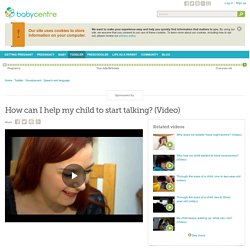
Show transcript Hide transcript. Why does my toddler love repetition? Paediatric speech and language therapist.
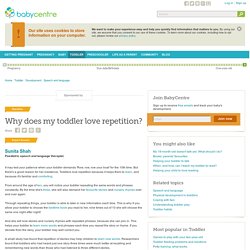
It may test your patience when your toddler demands 'Row, row, row your boat' for the 10th time. But there's a good reason for her insistence. Let's Talk. What do babies need in order to learn and thrive? One thing they need is conversation — responsive, back-and-forth communication with their parents and caregivers. This interactive engagement is like food for their developing brains, nurturing language acquisition, early literacy, school readiness, and social and emotional well-being.
A dispiriting number of children don’t get that kind of brain-fueling communication, research suggests. In early childhood policy (and in the wider media), much attention has been paid to the so-called word gap — findings that show that low-income children hear 30 million fewer words, on average, and have less than half the vocabulary of upper-income peers by age three. But putting that alarming number in the spotlight obscures a more critical component of the research, says Harvard Graduate School of Education literacy expert Meredith Rowe: it’s not so much the quantity of words but the quality of the talk that matters most to a child’s development. Deb Roy: The birth of a word. Listen to Your Mother. Young children face a remarkable challenge in learning to use the language of their culture.
Toddlers vary widely, however, in the rate at which they learn new words.1 A team of Harvard Graduate School of Education researchers set out to ask whether and how children's language environment can impact vocabulary development. In their study of mother-child pairs from low-income families, they found that mothers who used many different words (not just many words) had toddlers with faster growth in vocabulary use. During the toddler and preschool years, most children learn to use hundreds of words, combining them into sentences and engaging in conversation with others. From previous research, we know that variation in vocabulary growth relates to child characteristics like gender, and also to parental factors. What did they find? 1Huttenlocher, J., Haight, W., Bryk, A., Seltzer, M., & Lyons, T. (1991). 2Bauer, D.J., Goldfield, B.A., & Reznick, J.S. (2002). Early Childhood Care and Education. Early childhood, defined as the period from birth to eight years old, is a time of remarkable growth with brain development at its peak.

During this stage, children are highly influenced by the environment and the people that surround them. Early childhood care and education (ECCE) is more than preparation for primary school.